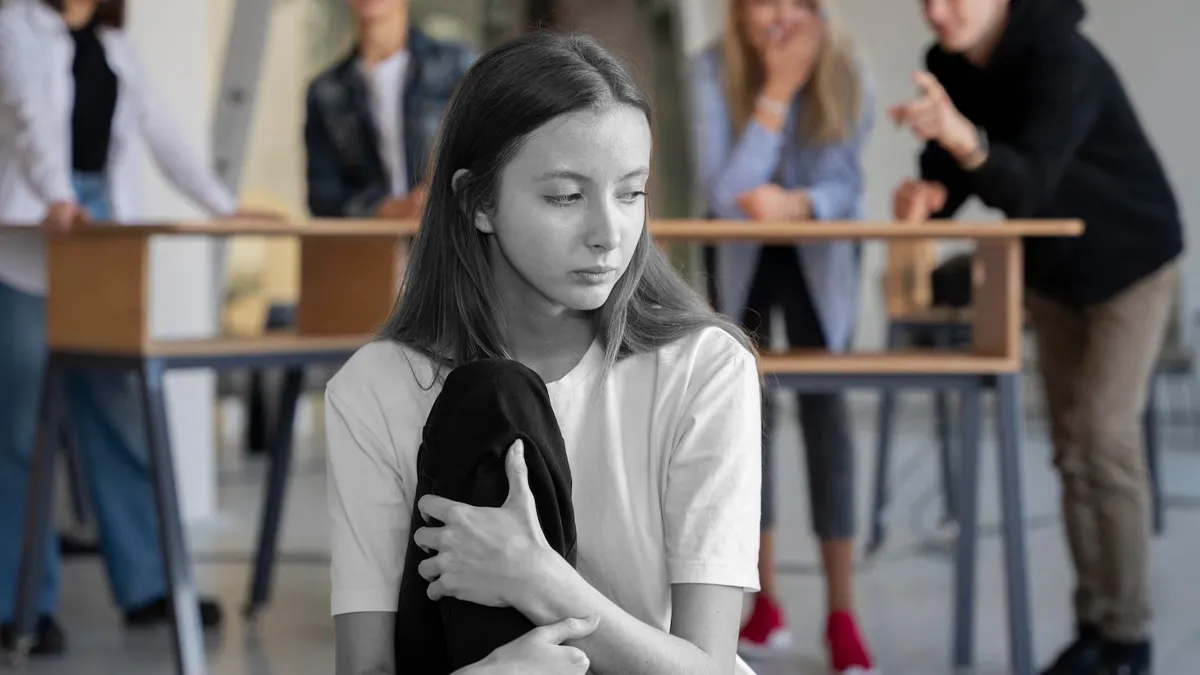
“It began subtly — classmates making fun of how I looked, spoke, or the things I was interested in. Over time, the jokes turned into persistent taunts and deliberate exclusion. There were days when I’d walk into class and feel a wall of silence around me, or hear snickers when I tried to participate in discussions. What made it worse was how normalised it all seemed; teachers rarely intervened, and I was too afraid to speak up” – this isn’t a scene from a movie. It is a real life experience of a 28-year-old Delhi-based journalist. At that tender age, Saumya Rastogi was not even aware that what she was facing was ‘bullying’. Unfortunately, she is not the only one. Many people, all over the world, face bullying and harassment from peers – not just in schools or colleges, but even in their workplaces.
Table of Content:-
Recently, Hollywood actress Millie Bobby Brown reportedly filed a harassment and bullying claim against her Stranger Things co-actor David Harbour. If the 21-year-old actress, despite being a popular name, faced something like this, then this tells a lot about how common bullying is, and that no one is immune to it.
Bullying can break you, not just mentally, but even physically. It has far-fetching negative effects on your health. Like Rastogi, few others also opened up to us and shared their traumatic experiences with bullying, and how it impacted them.
To get an expert view on the mental and physical implications of bullying and harassment, we reached out to Dr Pavitra Shankar, Associate Consultant, Psychiatry Aakash Healthcare. Keep reading.
‘Bullying Made Me Shrink Into Myself’: Horror Stories Of Harassment
Due to the constant bullying, Rastogi dreaded going to school every morning. “My confidence took a sharp hit — I began doubting my abilities, avoided raising my hand even when I knew the answers, and felt constantly anxious about what others thought of me. The fear of ridicule made me shrink into myself. Looking back, those years left a deep emotional imprint that took time to unlearn,” she recalls.
Another 27-year-old Delhi-based journalist too shared her experience. She recalls, “I never had too many friends in school. There was a group of four or five girls who often made fun of me for being slow or quiet. I was an average student who never really stood out for anything. I never understood what made them laugh at me or pinch me, but I knew they never wanted me to be part of any group activity. They came from well-off families, while mine couldn’t afford canteen food, birthday parties, or fancy stationery like theirs. I still remember sitting alone on the school ground, wondering why no one wanted to be my friend. Looking back now, I feel maybe I was never meant to fit into their world anyway,” shares Sameeksha Sharma.
For 29-year-old Navasha Khanna, Manager, Community Building - Health & Lifestyle, it was a haircut that invited bullying from her classmate. "It’s strange how something as simple as a haircut in my teens gave me trauma. Back in 8th grade, a girl from my class made fun of me and bullied me, just because my haircut looked similar to that of the popular girl in our school. It made me hate my own hair for years. Ever since, whenever I sense negativity, I pull back. That little version of me still just wants to feel safe around people or in her environment," shares Khanna.

‘Kindness Healed Me’: Coping With Bullying And Harassment
Dealing with bullying is not at all an easy task, but people do fight back and find their voice again. “What eventually helped me heal was finding small pockets of kindness — a teacher who encouraged me, a friend who stood by me, and later, creative outlets like writing and reading where I could express what I couldn’t say aloud,” shares Rastogi.
“As I grew older, I learned to understand that bullying often reflects the bully’s own insecurities, not the victim’s flaws. Therapy and self-reflection helped me rebuild my self-esteem, set boundaries, and let go of the shame I carried for so long. Today, I try to be the person I needed back then — someone who listens, believes, and reminds others that they deserve respect and safety, no matter where they are,” she adds.
Sharma too started journaling to cope with the trauma of bullying in school. “Eventually, writing became my lifelong friend. However, now I am truly happy with the life I’ve created for myself,” she says.
Also Read: How To Deal With Toxic Work Environments, Expert Weighs In
How Bullying Affects Mental Health
Dr Shankar shares that bullying and harassment can cause deep emotional distress. “Constant humiliation, threats, or exclusion can trigger anxiety, depression, low self-esteem, and social withdrawal. The brain perceives bullying as a threat, activating the stress response system again and again. Over time, this leads to emotional exhaustion and a constant sense of fear or worthlessness. Victims often lose confidence and start doubting their own abilities,” she explains, and adds, “Chronic exposure to bullying damages a person’s emotional resilience. Victims start internalising negativity and blame themselves, which worsens anxiety and depression.”
The expert shares that prolonged bullying can even result in Post-Traumatic Stress Disorder (PTSD) or complex trauma. “Adults who faced bullying in childhood often show PTSD-like symptoms years later-especially if they never received emotional support or counselling. Victims may relive bullying incidents through flashbacks, nightmares, or panic attacks. The symptoms are similar to those seen in survivors of physical abuse. Other conditions linked with bullying include generalised anxiety disorder, panic disorder, social phobia, and adjustment disorder,” mentions Shankar.
Physical Health Effects Of Bullying
“When mental stress persists, it manifests physically. The body’s ‘fight or flight’ mode never switches off. Bullying affects the body as much as the mind. Continuous stress elevates cortisol levels, disturbing sleep and digestion,” explains Dr Shankar. She adds that victims frequently complain of:
- Headaches and fatigue.
- Stomach aches and nausea (especially children before school).
- Muscle tension or unexplained pains.
- Lowered immunity and frequent infections.
Also Read: Mental Health Matters: The Impact Of Mockery And Trends On Self-Esteem Of Girls
Tips To Deal With Bullying
On this note, Dr Shankar shares tips for those who are victims of bullying – be it in their school or workplace. Take a look:
For Children (School Bullying):
- Speak up: Talk to parents, teachers, or a trusted adult.
- Don’t isolate yourself: Spend time with supportive friends.
- Counselling helps: Early therapy can rebuild confidence.
- Stay active: Sports, art, or hobbies can reduce stress hormones.
For Adults (Workplace Bullying):
- Document incidents and report through proper HR channels.
- Seek professional counselling to manage anxiety.
- Avoid internalising blame — the problem lies with the bully.
- Practice stress-management through meditation, exercise, and healthy sleep.
Dr Shankar explains that unaddressed bullying can lead to chronic depression, PTSD, relationship difficulties, and substance abuse. Adults bullied as children often carry emotional scars into personal and professional life. “Long-term victims may also develop trust issues, body image concerns, or suicidal ideation. Bullying is psychological violence. Its impact can last decades if not healed through empathy, awareness, and therapy,” concludes Dr Shankar.
The Final Word
Bullying and harassment can cause deep emotional distress, as well as has physical implications like PTSD. Its impact can last for decades, if not treated timely. Victims of bullying are advised to speak up against it, try to get help from people around them or seek professional help.
Also watch this video
FAQ
What are the long term effects of bullying?
Long-term effects of bullying include increased risks for mental health issues like depression, anxiety, and suicidal thoughts, as well as physical health problems.What impact does bullying have on development?
Young people experiencing bullying may feel that they aren't worth help or that nobody likes them. They may feel self-conscious or embarrassed lots of the time.How does bullying impact the brain?
Chronic bullying leads to an increased release of stress hormones, like cortisol, especially in brain areas involved with reward-processing.
How we keep this article up to date:
We work with experts and keep a close eye on the latest in health and wellness. Whenever there is a new research or helpful information, we update our articles with accurate and useful advice.
Current Version
Nov 15, 2025 15:05 IST
Modified By : Shruti DasNov 15, 2025 15:05 IST
Published By : Shruti Das
